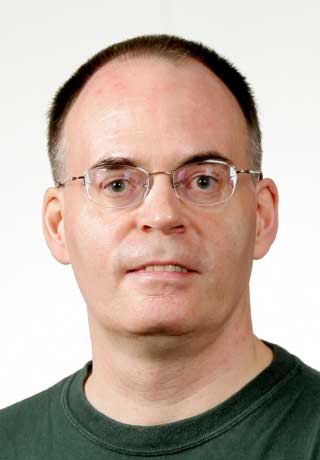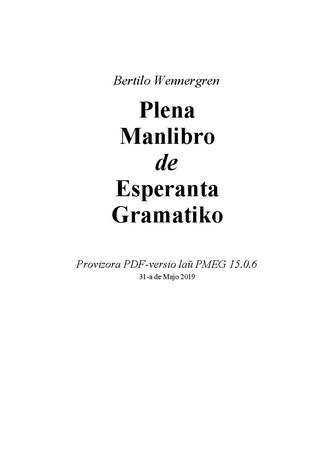David Gaines (born October 20, 1961) is an American composer.
David Gaines (born October 20, 1961) is an American composer.
He wrote the first orchestral symphony to incorporate texts written in Esperanto, and an Esperanto choral song, Povas Plori Mi Ne Plu ("I Can Cry No Longer"), which concerns the former military situation in Bosnia and Herzegovina. This song won First Prize at the 1995 World Esperanto Association's Belartaj Konkursoj (competitions in the field of Belles lettres) in Tampere. Gaines holds degrees in music composition from Northwestern University, American University, and Johns Hopkins University's Peabody Conservatory of Music.
His Esperanto symphony, available as a CD with Vit Micka conducting and Kimball Wheeler singing mezzo-soprano, was premiered by the Moravian Philharmonic in Olomouc, Czech Republic in October 2000. The four movements feature texts originally written by renowned Esperantists including L. L. Zamenhof and Marjorie Boulton, as well as Bulgarian poet Penka Papazova and Gaines himself. [1] Within the Esperanto movement, Gaines serves as an advisory board member of the Esperantic Studies Foundation and holds the title of Honorary President of the Music Esperanto League (Muzika Esperanto-Ligo).

Esperanto is the world's most widely spoken constructed international auxiliary language. Created by the Warsaw-based ophthalmologist L. L. Zamenhof in 1887, it was intended to be a universal second language for international communication, or "the international language". Zamenhof first described the language in Dr. Esperanto's International Language, which he published under the pseudonym Doktoro Esperanto. Early adopters of the language liked the name Esperanto and soon used it to describe his language. The word esperanto translates into English as "one who hopes".

Esperantujo or Esperantio is the Esperanto community; the community of speakers of the Esperanto language and their culture, as well as the places and institutions where the language is used. The term is used "as if it were a country."

A number of musical works are available in the Esperanto language. The phrase "Esperanto music" is sometimes used to include music which is about Esperanto.

William Auld was a British poet, author, translator and magazine editor who wrote chiefly in Esperanto.

The Esperanto Wikipedia is the Esperanto version of Wikipedia, which was started on 11 May 2001, alongside the Basque Wikipedia. With over 328,000 articles as of December 2022, it is the 36th-largest Wikipedia as measured by the number of articles, and the largest Wikipedia in a constructed language.
Finvenkismo is an ideological current within the Esperanto movement dating back to L. L. Zamenhof, the initiator of Esperanto. The name is derived from the concept of a fina venko denoting the moment when Esperanto will be used as the predominant second language throughout the world. A finvenkist is thus someone who hopes for or works towards this "final victory" of Esperanto. According to some finvenkists, this "final victory" of Esperanto may help eradicate war, chauvinism, and cultural oppression.
Reto Rossetti was a poet and an Esperantist professor. He was Italian-Swiss and retained his nationality, although he lived all his life in Britain. His professional career as a teacher in art colleges culminated as Head of the art education department at Bristol university. His elder brother was Cezaro Rossetti, author of Kredu min, sinjorino!. He died at Gosport.

Bertilo Wennergren is a Swedish Esperantist currently living in the village of Schossin in northern Germany.

Raymond Schwartz was a French banker and Esperanto author who wrote many poems and novels in Esperanto, as well as skits which he directed for Parisian Esperanto cabarets.
Montagu Christie Butler was a British academic, librarian, lexicographer, musician, and Esperantist. A winner of several prizes at the Royal Academy of Music in London, he was a harpist and a versatile music teacher skilled in playing various musical instruments, as well as a teacher of voice and of musical composition.

Eugen Wüster was an industrialist and terminologist.
The initiator of Esperanto, L. L. Zamenhof, translated the entire Hebrew Bible into Esperanto. His translation has been much admired by Esperantists and is widely held up as a model or exemplar for other Esperanto authors and translators. Other translators have also edited and published Esperanto versions of the New Testament and Apocrypha.

Wim De Smet was a Flemish zoologist, specialized in marine mammals, and an esperantist. He published a lot of scientific and popularizing articles in Dutch, English, French and Esperanto. He projected an entirely new system for the naming and classification of animals and plants.

Summer Esperanto Study is the biggest annual international event aiming to teach Esperanto. It occurs every summer since 2007, lasts for a week and attracts up to 250 participants from 30 countries, being aimed both at beginners and fluent speakers of the language. The event is organised by E@I and usually takes places in Slovakia, with the exception of 2014 when it also occurred in Russia. It has been supported several times by the Slovak ministry of education and the local mayor. In its first year, the event had a narrower focus and was called Slavic Esperanto Study.

Proverbaro Esperanta is a book of proverbs in Esperanto. It was arranged by L. L. Zamenhof according to a book of his father Mark Zamenhof. It contains 2630 proverbs.

Mark Zamenhof is Esperanto form of Markus Fabianoviĉ Samenhof, "Christian" name of Mordeĥaj Zamenhof, son of Fabian Zamenhof and father of L. L. Zamenhof ; teacher of languages French and German. Knight of many orders.

Plena Manlibro de Esperanta Gramatiko is a book which explains Esperanto grammar in an easy-to-learn format. It was mostly written by Bertilo Wennergren and is for ordinary Esperanto speakers who want to study Esperanto's grammar, word construction, writing and pronunciation.
Raumism is an ideology beginning in 1980 with the Rauma Manifesto, which criticized the goals of the traditional Esperanto movement and defined the Esperanto community as "a stateless diaspora linguistic minority" based on freedom of association.

The following outline is provided as an overview of and topical guide to Esperanto:
The Esperanto League of Bosnia and Herzegovina is the national Esperanto association in Bosnia and Herzegovina, which represents Esperanto speakers, Esperanto societies, and friends. Since its establishment in 1910, it helps advancement of Esperanto language learning and usage in Bosnia and Herzegovina.